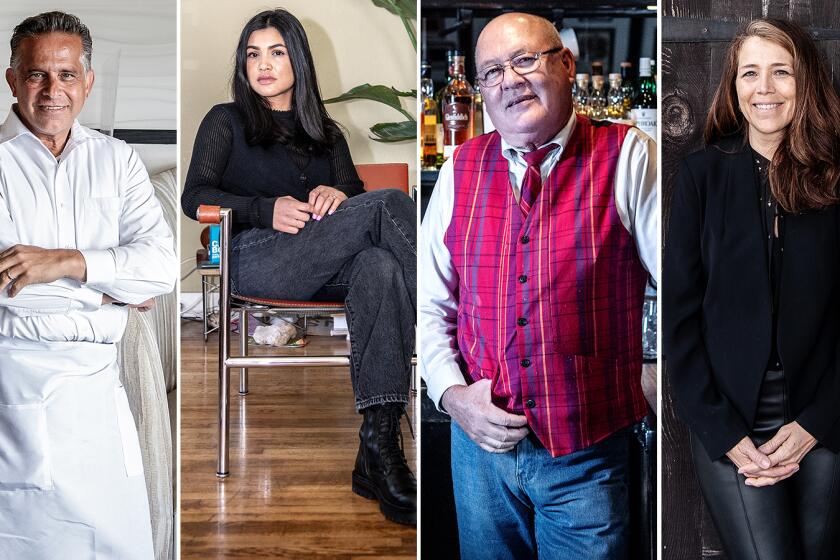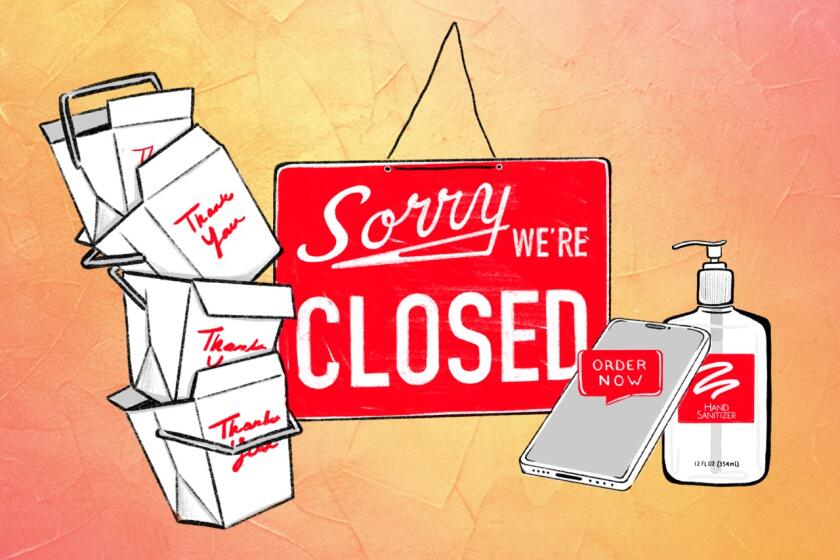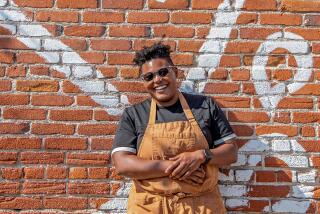COVID and the line cook: Job lost. Savings emptied. Love found
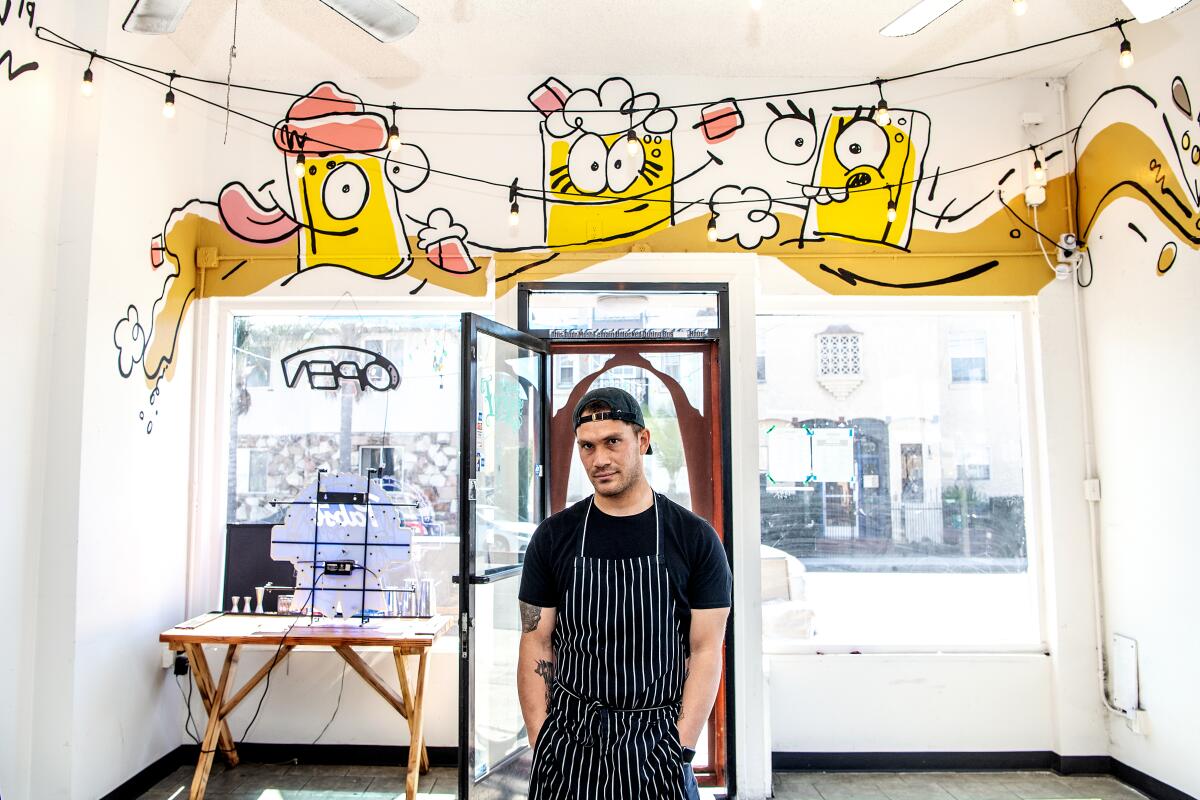
- Share via
Brennan Villarreal started the great pandemic year working as a line cook in a restaurant. He ended it the same way. That in itself is no mean feat at a time when the industry shed more than 2 million jobs nationwide.
Except.
He started the year at one restaurant and finished at another, whiplashed by layoffs and hires and more layoffs. A year of loss and uncertainty made the 29-year-old think long and hard about his culinary career and his life in California.
Villarreal was laid off from Lasa on March 15, the Sunday in 2020 that Los Angeles Mayor Eric Garcetti announced he was shutting down the city’s restaurant dining rooms, bars and nightclubs. It was the first emergency closure designed to stanch the spread of the novel coronavirus. It would not be the last.
Villarreal had worked for nearly two years at the Chinatown hot spot, described by critic Jonathan Gold as “a tasting-menu restaurant at the forefront of modern Filipino cuisine.” Lasa was a regular on this newspaper’s 101 Best Restaurants list.
The line cook was out of the country when he got the email from his bosses, reading the bad news while sitting at a cafe on a tropical island in the Philippines. He ended up stranded there when the pandemic turned his three-week vacation into a five-month ordeal. He ate through his savings.
After his return home late last summer, Villarreal was hired at the Stache Bar, a neighborhood joint on Long Beach’s Retro Row featuring beer-battered cheese curds, Buffalo pickled eggs and vegan Chicago hot dogs. But another shutdown brought another layoff. So he delivered packages for UPS, an assignment that dried up when the holidays ended.
The Stache Bar reopened at the end of January as the winter COVID surge waned, and Villarreal got his job back.
For a while, anyway.
“I had to adapt,” he said.
No kidding.
::
The mayor of Long Beach was upbeat on the first anniversary of the pandemic declaration. He stood before a downtown gourmet grocery — whose entire staff had been vaccinated — and predicted his city would move out of the most onerous tier of coronavirus restrictions “as early as the next day.”
“We have actually vaccinated over 10,000 food and grocery workers in the city of Long Beach and have offered this vaccine within the food industry to almost everyone that wants one,” Mayor Robert Garcia said during a March 11 briefing. “That’s been a really great development.”
A big step in that direction had happened a few days earlier on a breezy Friday in early March, when the city made more than 3,000 doses available at a food-workers-only clinic at the Long Beach Convention Center.
The World Health Organization announced the coronavirus outbreak had become a pandemic on March 11, 2020. Since then, the virus has seemingly touched all aspects of life in Southern California and beyond. The Times looks back on a full year of life in a pandemic.
Cars filled with food-industry workers wanting drive-up vaccines snaked around the complex. The Terrace Theater threw open its doors; those who arrived on foot were inoculated in the soaring, three-story lobby with glass walls and massive chandeliers. Once they got their first dose of the Pfizer vaccine, they waited 15 minutes on banquet chairs assembled on an outdoor plaza to make sure they had no ill effects.
Villarreal was vaccinated on that sunny afternoon just hours before his shift at the Stache and its sister restaurant, Sideburns. His arm, he said, was a little sore at first, “and I kind of felt it in my veins a little bit. It feels fine now. ... Hopefully, I don’t feel any symptoms when I’m working.”
Fifty-one weeks earlier, he was drinking coffee in a small cafe on an island called Siargao, the surfing capital of the Philippines. That’s when Chase Valencia, co-owner of Lasa, hit send on an email to his restaurant pamilya, “family” in Tagalog.
The note included a link to the California Employment Development Department’s COVID-19 page and guidelines on how to file for unemployment benefits. It was tinged with uncertainty and regret.
“It pains me to announce to everyone on staff that we are temporarily ceasing operations and cannot offer you hours,” Valencia wrote on March 15, 2020. “You are family to us. Each of you has brought some [sic] much love and passion to our little restaurant. Your impact and dedication to LASA is something special I can’t take for granted as an owner.”
Villarreal’s first thought on reading the email was a panicky “What am I gonna do? What’s my next plan? Like, I don’t know.”
That ended up being the least of his problems.
On the plus side, he filed for unemployment benefits before EDD became overwhelmed and mired in fraud. And he was able to surf every day he was on Siargao. He surfed a lot.
Because he couldn’t get off the island.
“I applied to get on a stranded-tourist flight,” he recounted. “I couldn’t get onto it because there were so many people trying to leave the island. And then I finally got onto it in July or August. And then I got stuck in Manila ... because you had to quarantine.”
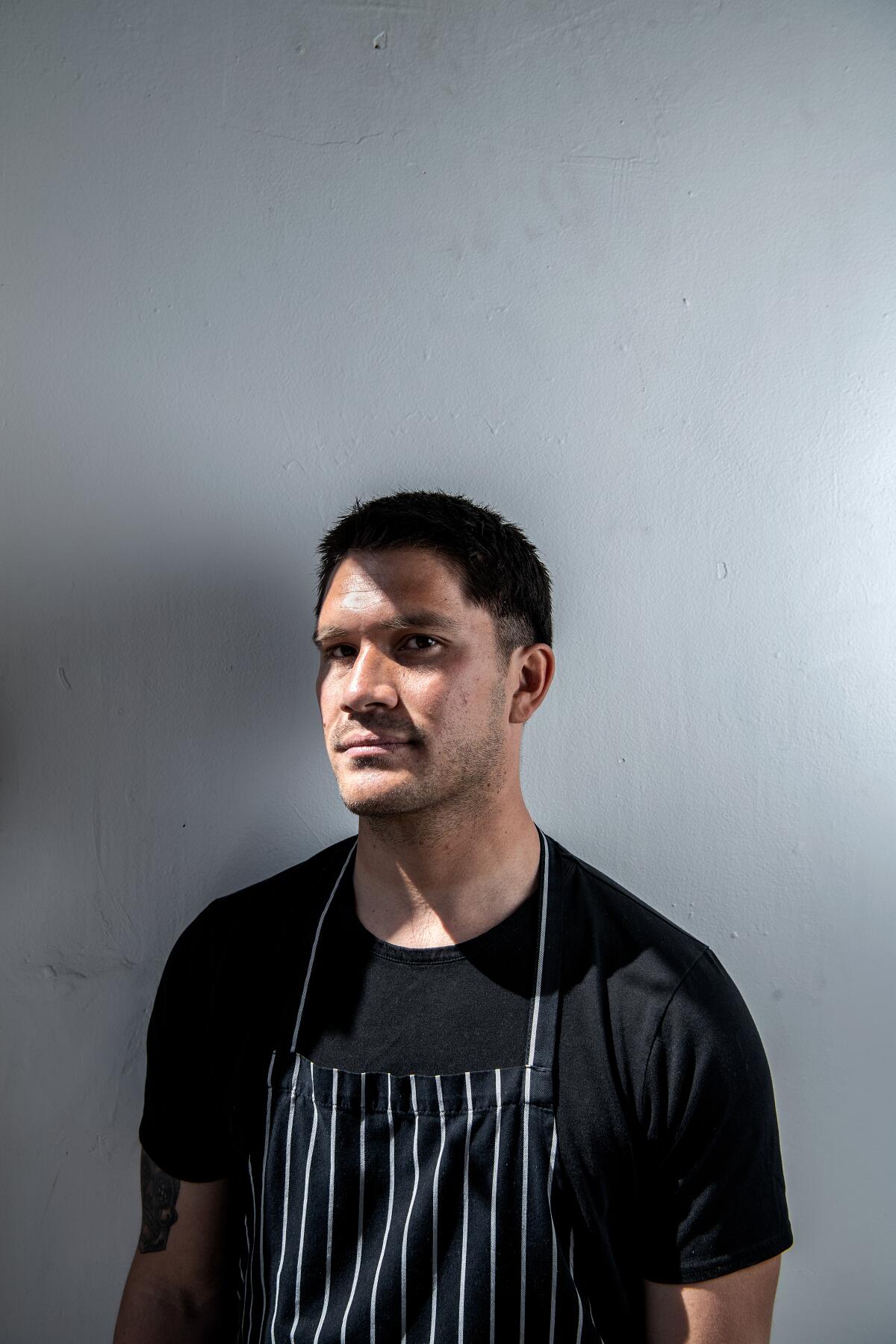
For months, every flight he booked was canceled. Refunds were slow in coming, but credit card bills still had to be paid. His passport had expired in May because “I wasn’t supposed to be there that long.”
When he finally arrived at Los Angeles International Airport, his parents were so afraid of COVID-19 that they wouldn’t pick him up. They had a time-share in Palm Springs, where he quarantined for a week. In August. When the average temperature is 107 degrees. The face shield he left in his rental car melted. He never left the hotel room.
After quarantining, Villarreal returned to Long Beach, where he lives with his 87-year-old grandmother and is her main caretaker. While he was stuck in Siargao, his extended family filled in.
At first, he was terrified to work outside the home.
“I lived with my grandma, and I didn’t want to be the person to get her sick and [make her] pass away. And everyone was scared in my family to come visit. We didn’t allow any visitors for months until after her vaccine.
“I just try to be careful.”
A longtime bartender, server and two managers look back at a year of COVID-19
::
Villarreal was peeling and chopping onions in the cramped Stache/Sideburns kitchen. His knife was almost as long as his tattooed forearm. Four days had passed since his vaccination. He was a study in dark monochrome: black jeans, black T-shirt, black ballcap, black face mask, black apron with a thin white stripe.
The onions would top hot dogs. Iceberg lettuce would go on the Works Burger, both carnivore and vegan. It’s a far cry from his Lasa days, when he mastered the Valencia brothers’ take on Filipino food like mushroom sisig, a vegetarian version of the unofficial national dish that sent critics swooning.
But the pay’s the same — $15 an hour. He is the only one in the kitchen, so there’s less coronavirus risk. And he can ride his bike here.
Valencia, who did not respond to a request for comment, had offered Villarreal a job at Lasita, the successor restaurant to Lasa. But it was too late.
He’d already sold his car to help finance his next adventure: another trip to the Philippines, this one with no return ticket.
Villarreal hopes to make the 7,000-mile-plus journey sometime in May. His new passport will have arrived by then, and he’ll have saved enough money. His plan is to help open a restaurant there at an island resort-in-progress called Happiness and revive his Los Angeles pop-up, Pogi Silog, “Handsome Fried Rice and Egg,” in new surroundings.
A look back at how the pandemic reshaped L.A.’s restaurant scene
During his long coronavirus exile, he fell in love — with a woman who runs another resort on tropical Siargao. And he fell out of love — with expensive California and the burdens of restaurant life here.
“A lot of us, we’re just making [enough] to get by,” he said. “I think we need to raise prices ... to give back to the employees. A lot of restaurateurs, they barely have enough money to give back. Pay rent and then pay everything else, and they don’t have a lot of money even for themselves.”
It was hard before the pandemic, he said. It’s even harder now.
“I think it’s maybe a wake-up call to change how things are.”
More to Read
Eat your way across L.A.
Get our weekly Tasting Notes newsletter for reviews, news and more.
You may occasionally receive promotional content from the Los Angeles Times.

